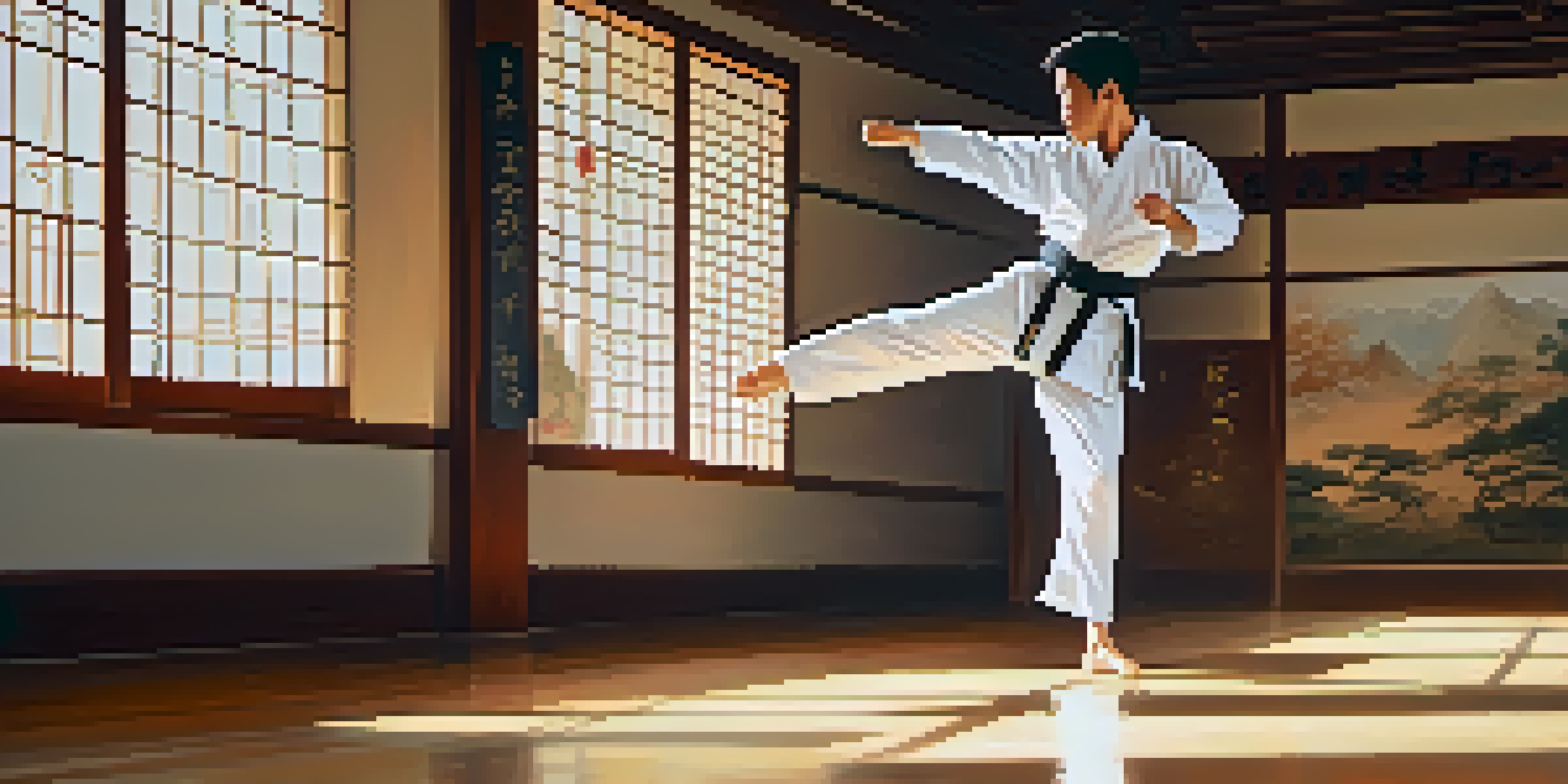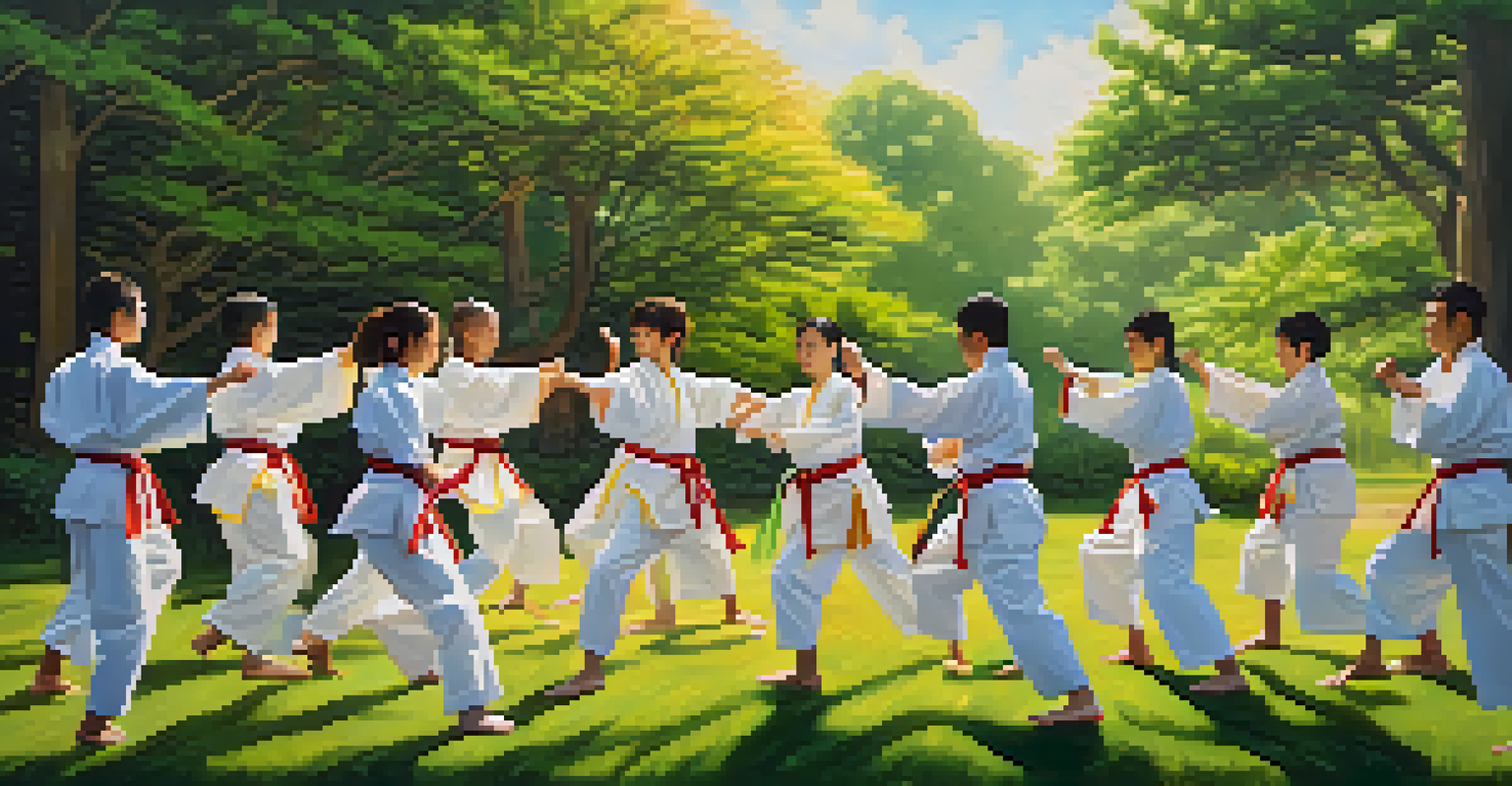Mind-Body Connection: The Psychological Impact of Martial Arts

Understanding the Mind-Body Connection in Martial Arts
The mind-body connection refers to the relationship between our mental state and physical health. In martial arts, this connection is particularly strong, as practitioners learn to focus their mind while engaging their bodies. This synergy not only enhances physical performance but also boosts mental clarity and emotional resilience.
The mind is everything. What you think you become.
Imagine a martial artist executing a complex move; every element, from their breathing to their mental focus, plays a crucial role. This practice fosters a profound awareness of how thoughts and emotions can influence physical actions. As students train, they often discover that improving their physical skills can lead to greater mental discipline and emotional stability.
Through consistent practice, martial artists develop a heightened sense of self-awareness. This awareness is vital, as it allows individuals to recognize stressors, manage anxiety, and cultivate a positive mindset. Ultimately, this connection paves the way for personal growth both on and off the mat.
Stress Relief and Mental Clarity Through Martial Arts
Engaging in martial arts offers a powerful outlet for stress relief. The physical exertion involved helps release endorphins, often referred to as 'feel-good' hormones, which can significantly reduce feelings of anxiety and tension. As students immerse themselves in their practice, they often find a natural escape from daily pressures.

Consider the metaphor of a pressure cooker: when it builds up too much steam, it needs a release valve to prevent an explosion. Martial arts serve as that release valve, allowing practitioners to channel their frustrations and stress into focused movements. This not only alleviates stress but also enhances mental clarity.
Mind-Body Connection Enhances Performance
Practicing martial arts fosters a powerful mind-body connection that boosts both physical performance and mental clarity.
Moreover, the structured environment of martial arts classes encourages mindfulness. Participants are trained to stay present in the moment, which helps clear their minds of distractions. Over time, this practice of mindfulness can lead to improved focus and concentration in everyday life.
Building Resilience Through Martial Arts Training
Resilience is the ability to bounce back from challenges, and martial arts training inherently promotes this quality. During training, students regularly face physical and mental obstacles, teaching them how to persevere. Each challenge they overcome builds their confidence and equips them with tools to handle life's adversities.
Success is not final, failure is not fatal: It is the courage to continue that counts.
Think of resilience as a muscle; the more you train it, the stronger it becomes. Martial arts provide a safe space for individuals to confront fears, whether it's sparring with a partner or mastering a new technique. This repeated exposure to challenges fosters a mindset of growth and adaptability.
As practitioners learn to face discomfort and setbacks, they develop a greater capacity for patience and determination. These traits not only apply to martial arts but also translate into everyday situations, enhancing their ability to cope with stressors outside the dojo.
The Role of Discipline in Martial Arts and Mental Health
Discipline is a cornerstone of martial arts training, requiring practitioners to commit to regular practice and improvement. This discipline extends beyond physical training; it also encompasses mental fortitude and emotional regulation. By adhering to a training regimen, individuals cultivate habits that positively impact their mental health.
Imagine a gardener tending to their plants; consistent care leads to growth and flourishing. Similarly, the discipline fostered through martial arts practice nurtures the mind, helping individuals develop healthier thought patterns and coping strategies. This growth mindset is essential for maintaining mental well-being.
Discipline Cultivates Mental Resilience
The discipline developed through martial arts training helps individuals build resilience, enabling them to handle life's challenges effectively.
As students progress in their training, they learn to set and achieve goals, which builds self-efficacy. This sense of accomplishment can significantly boost self-esteem and promote a positive outlook on life. The discipline learned in martial arts becomes a powerful tool for navigating personal challenges with confidence.
Social Connections and Community in Martial Arts
Martial arts often foster a strong sense of community among practitioners. Training together creates bonds that can lead to lasting friendships and support networks. This social aspect is crucial for mental health, as it helps combat feelings of loneliness and isolation.
Consider a team of athletes working towards a common goal; their shared experiences and encouragement create a powerful support system. In martial arts, this camaraderie is evident during training sessions and competitions, where participants cheer each other on and celebrate achievements together. These connections can significantly enhance one's sense of belonging.
Moreover, the diverse backgrounds and experiences of martial arts practitioners enrich the learning environment. Engaging with others who share a passion for martial arts can broaden perspectives and foster empathy. This sense of community not only enhances the training experience but also contributes positively to overall mental well-being.
Mindfulness and Meditation in Martial Arts Practice
Many martial arts incorporate mindfulness and meditation techniques, which play a vital role in enhancing psychological well-being. These practices encourage practitioners to cultivate awareness of their thoughts and emotions, leading to improved self-regulation. Through mindfulness, individuals can learn to respond to stressors more calmly and effectively.
Imagine a still pond reflecting the sky; when the waters are calm, clarity is achieved. Similarly, mindfulness practices in martial arts help clear mental clutter, allowing individuals to gain better insight into their emotions and thoughts. This clarity can lead to more thoughtful decision-making and reduced reactivity in challenging situations.
Community Supports Mental Well-Being
The strong sense of community in martial arts provides social support, combating feelings of loneliness and enhancing overall mental health.
By integrating mindfulness into their training, martial artists can experience profound shifts in their mental state. Regular practice can lead to increased emotional resilience, reduced anxiety levels, and a greater sense of inner peace. This transformation enriches their martial arts journey and enhances overall mental health.
Conclusion: The Transformative Power of Martial Arts
In conclusion, the psychological impact of martial arts extends far beyond physical fitness. The mind-body connection cultivated through training enhances emotional resilience, stress relief, and discipline. As practitioners navigate challenges both on and off the mat, they discover the transformative power of martial arts in their lives.
From building strong social connections to fostering mindfulness, martial arts offer numerous psychological benefits that contribute to overall well-being. This holistic approach not only improves physical skills but also nurtures mental health, making martial arts an invaluable practice for many.

Ultimately, the journey through martial arts is one of growth, self-discovery, and empowerment. By embracing this path, individuals can unlock their potential and enjoy the profound benefits of the mind-body connection.